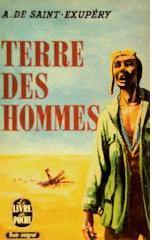Recipient of the Grand Prix of the Academie Francaise, Wind, Sand and Stars is unsurprassed in capturing the grandeur, danger, and isolation of flight. Its exciting account of air adventure – through the treacherous passes of the Pyrenees, above the Sahara, along the snowy ramparts of the Andes – combined with lyrical prose and the soaring spirit of a philosopher, make this book one of the most popular works ever written about flying.
Review:
The steadily growing stream of birth and marriage announcements on my Facebook feed has led me to rethink these “steps” that most people take each passing year. I used to think (and still sometimes do when I’m feeling unsure or cynical) that this seemingly prewritten way of living, of societal norms pushing us forward, was depressing evidence for a lack of creativity. But lately I see these steps not as predetermined chains on a pair of manacles we never knew we were wearing, but as a climb up a mountain or a neverending game of “I dare you.” I dare you to try more, to do something different, to remember or to learn how best to live.
We only have one first. A first time riding in a plane, a first time seeing the ocean, a first time eating an orange, a first time falling in love. It happens and it finishes in the same moment. A simultaneous life and death that will slowly kill us if we don’t realize it.
Antoine de Saint-Exupéry wants us to realize it. To do so he shares exquisite moments where he realized it during his career as an Aéropostale pilot in Northern Africa and South America. He’s lying atop a pebbled ledge in the Sahara Desert and finds a meteorite and knows he’s the only soul who has ever seen this rock. It’s a first, but one that he wants us to savor. He’s in the desert in Libya, three days without water, and he sees fantastic mirages—they are false, but they are something new only once, and he wants us to appreciate that.
What he wants is neither that new nor that radical. By recounting his memories he wants to inspire us to unlock our hands from our keyboards, to put our wallets back in our pockets, to unleash the shopkeepers from their shops, to look in a mirror, to look at each other, and to recognize something.
In English this humanist adventure tale is titled Wind, Sand, and Stars, evocative but lacking. The French title, Terre des hommes, or Land of Men, is better. There is no wind, there is no sand, there are no stars, if we are not there to observe them, or even more, to appreciate them. Life is a battle to stay awake. And according to Saint-Exupéry, it doesn’t have to be much of a battle if we just look around every once and a while. Whether we’re flying across the Andes in a snowstorm straining to find the light of a house and human soul below or whether we simply open our eyes while walking down the street, we can win the battle. Being awake will no longer mean adhering to a game of “I dare you,” a set of steps leading to more, more, more to stop us from getting bored. Everyday can have a first, every person can be awake, if we remember every single moment that we’re alive on this sphere in the universe.






